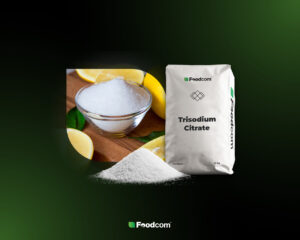- Trisodium citrate (E331) is a salt of citric acid used as a food additive, acidity regulator, emulsifier and preservative.
- It is used in the food industry, medicine (as an anticoagulant and medicine) and analytical chemistry.
- It can support the physical performance of athletes by neutralising acids formed during exercise.
- It is considered safe, but excessive consumption can lead to health problems related to sodium levels.
Trisodium citrate (otherwise known as citric acid sodium salt) is a flavouring food additive designated E331. It is obtained by reacting citric acid with sodium hydroxide, carbonate or bicarbonate, then crystallising and dehydrating. It also occurs naturally in citrus fruits. It is commonly referred to as ,’sodium citrate’, but this term is ambiguous, as it can also refer to disodium or monosodium salt.
In the structure of E331, each of the three sodium atoms is attached to one of the three carboxyl groups. Similarly, monosodium citrate is a chemical compound with one sodium in the molecule and disodium citrate is a chemical compound with two sodium atoms.
Chemical formula of trisodium citrate: C₆H₅Na₃O₇
Properties of trisodium citrate
Trisodium citrate is a white, odourless powder with a slightly salty taste, which can be found in hydrate form. It has the ability to readily absorb water from its surroundings due to its hygroscopic properties, so it is recommended to store it in dry conditions, protected from moisture. Although it is a salt of citric acid, its pH in aqueous solution is between 7 and 9, making it a slightly alkaline substance.
Trisodium citrate occurs both as a crystalline substance and in powder form. Its colour is colourless or white and its characteristic taste is a combination of saltiness and mild acidity. It dissolves very well in water, but its solubility in alcohol is greatly reduced. Thanks to its buffering properties, it stabilises the pH of the solutions in which it is present, which makes it often used as an acidity regulator.
Uses for trisodium citrate
Trisodium citrate has many uses, but is mainly used in the food industry. It has similar uses to citric acid, so it is typically used as a flavour enhancer, to acidify food or beverages and as a preservative.
It is also commonly used in medicine as an ingredient in medicines, usually for people with urinary tract infections. It also acts as an anticoagulant, meaning that it inhibits blood clotting.
In addition, E331 is used in chemistry as an ingredient in buffers and an ingredient in the Benedict’s reagent, which is used to detect sugars and aldehydes. It is also found in cosmetics such as shower gels, shampoos and skin creams, as it gives them the right level of acidity and is used as a preservative.
Other uses for trisodium citrate include descaling boilers, cleaning car radiators and burnt tin or pots. It is also used in the manufacture of cleaning products, as it softens water so that detergents can work more effectively.
Trisodium citrate in the food industry
It can be found in fizzy drinks, dairy products, confectionery, delicatessen products, canned meat and vegetables, margarine, mustard, sauces, mayonnaise, condiments, jams and much more. This is not surprising, as trisodium citrate has various properties that are important to the food industry.
Firstly, trisodium citrate is used as an acidity regulator to maintain the correct pH of the product. It can be found in fizzy drinks, especially those with lemon flavour, energy drinks, desserts or jams.
This chemical compound is a sequestrant, i.e. a substance that binds metal ions so that these cannot have a harmful effect on the body, and the consumer is protected from the harmful effects of heavy metals in food.
Trisodium citrate is also an emulsifier – it enables a uniform solution to be prepared from two immiscible liquids. It is useful, for example, in the production of cheeses that do not become oily when melted, as it prevents the separation of fats.
Another use of trisodium citrate in the food industry is as a preservative. It protects the fats in the product from oxidation and rancidity. It also prevents colour changes in foods.
Trisodium citrate in medicine
The sodium salt of citric acid is known not only as a food additive, but also as an important chemical compound in medicine. It is used in analytical laboratories where blood tests are carried out because it has an anticoagulant effect. It prevents blood cells from clumping together. It is therefore used as an ingredient in solutions for filling haemodialysis catheters. It lowers the concentration of heparin, which in turn reduces the risk associated with clotting disorders in patients with kidney disease or blood clotting. This counteracts side effects during and after the dialysis procedure. This action is also extremely useful for blood storage or during transfusions.
Trisodium citrate is also used as a medicine. It treats kidney stones, gout and reduces the symptoms of metabolic acidosis. It can also be used as a laxative. It is also used for hypercalcaemia, a condition in which the concentration of calcium in the blood is too high. E331 acts by increasing the excretion of calcium through the urine.
Benefits for athletes
Trisodium citrate may have some benefits for athletes, especially those who engage in intense physical activity. One of the main benefits is its ability to act as an acid buffer. During intense training, the body produces lactic acid, which can cause muscle fatigue and reduce performance. Citric acid sodium helps neutralise excess acids, which can delay the onset of fatigue and increase athletic performance.
Athletes, especially those training in endurance sports such as long-distance running, cycling or triathlon, can benefit from trisodium citrate supplementation to improve performance. This supplementation can help improve the body’s ability to perform prolonged exercise by increasing the buffering capacity of lactic acid.
Trisodium citrate can also support hydration of the body. Its action in combination with sodium contributes to better fluid retention, which is important during prolonged exercise, especially in hot climates. Ensuring adequate hydration levels is key to maintaining physical performance and preventing muscle cramps.
However, it is worth remembering that trisodium citrate supplementation should be used in moderation and preferably under the supervision of a specialist. Too high a dose can cause gastrointestinal complaints such as diarrhoea or abdominal pain, which can negatively affect athletic performance. It is recommended that a sports nutritionist or doctor is consulted before starting supplementation.

Is trisodium citrate harmful?
Trisodium citrate is generally considered safe for consumption when used as recommended and in acceptable doses. Its safety status has been approved by regulatory bodies such as the European Food Safety Authority (EFSA) and the US Food and Drug Administration (FDA).
Although it is safe for general use, it is worth remembering that excessive consumption of this food additive can lead to some adverse health effects. Excess sodium in the diet can contribute to elevated blood pressure, which in turn can increase the risk of cardiovascular disease. Therefore, people suffering from hypertension or other sodium-related conditions should limit their intake of products rich in sodium citrate.
On the other hand, it has been used successfully in medicine, including as an anti-clotting agent and as a medication to help treat certain conditions such as kidney stones and gout. However, any use of this compound should be controlled by a doctor.
Trisodium citrate is an extremely versatile chemical compound used in many different fields, from the food industry to medicine and analytical chemistry. Its widespread use is due to its unique properties, such as acidity regulation, anticoagulant action and its ability to soften water and prevent fat separation. Used consciously and in the right doses, trisodium citrate contributes to both improving the quality of food and assisting in the treatment of various diseases and improving physical performance in athletes.
Our Sales Support team assists our Sales Partners in conducting business transactions efficiently and effectively to ensure the highest quality of service for all our Sales Partners. The logistics team will take care of transport and the finance department will be responsible for all matters relating to the financial part of the transaction.











